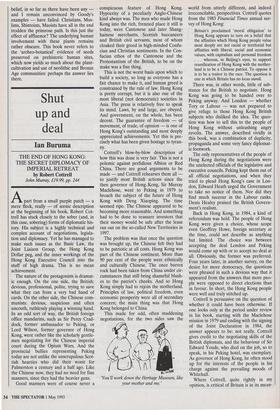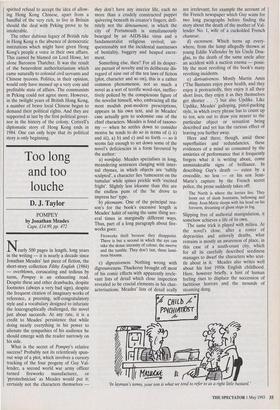Shut up and deal
Ian Buruma
THE END OF HONG KONG: THE SECRET DIPLOMACY OF IMPERIAL RETREAT by Robert Cottrell John Murray, f19.99, pp. 244 Apart from a small purple patch — a mere fleck, really — of scenic description at the beginning of his book, Robert Cot- trell has stuck closely to the sober (and, in this case, sobering) forms of diplomatic his- tory. His subject is a highly technical and complex account of negotiations, legisla- tion and diplomacy. Yet he has managed to make such issues as the Basic Law, the Joint Liaison Group, the Hong Kong Dollar peg, and the inner workings of the Hong Kong Executive Council into the stuff of high drama. This is no mean achievement.
The nature of the protagonists is dramat- ic enough. On the one side, the British: devious, professional, polite, trying to save what they can from a very bad hand of cards. On the other side, the Chinese com- munists: devious, suspicious and often uncouth, ruthlessly playing a winning hand. In an odd sort of way, the British foreign office mandarins, such as Sir Percy Crad- dock, former ambassador to Peking, or Lord Wilson, former governor of Hong Kong, were rather like the scholarly gentle- men negotiating for the Chinese imperial court during the Opium Wars. And the provincial bullies representing Peking today are not unlike the unscrupulous Scot- tish hearties who did their worst for Palmerston a century and a half ago. Like the Chinese now, they had no need for fine manners, since they had the heavier guns.
Good manners were of course never a conspicuous feature of Hong Kong. Hypocrisy of a peculiarly Anglo-Chinese kind always was. The men who made Hong Kong into the rich, frenzied place it still is today, were Cantonese and later Shang- hainese merchants, Scottish buccaneers and British civil servants, most of whom cloaked their greed in high-minded Confu- cian and Christian sentiments. In the Con- fucian ethos of the Cantonese and the Protestantism of the British, to be on the make was a fine thing.
This is not the worst basis upon which to build a society, so long as everyone has a fair chance to make it, and human greed is constrained by the rule of law. Hong Kong is pretty corrupt, but it is also one of the most liberal (not democratic) societies in Asia. The press is relatively free to speak its mind. Laws, by and large, are obeyed. And government, on the whole, has been decent. The guarantee of freedom — of movement, of trade, of opinion — is one of Hong Kong's outstanding and most deeply appreciated achievements. Yet this is pre- cisely what has been given hostage to tyran- ny.
Cottrell's blow-by-blow description of how this was done is very fair. This is not a polemic against perfidious Albion or Red China. There are good arguments to be made — and Cottrell rehearses them all to justify most British actions since the then governor of Hong,Kong, Sir Murray Maclehose, went to Peking in 1979 to broach the subject of the future of Hong Kong with Deng Xiaoping. The time seemed ripe. The Chinese appeared to be becoming more reasonable. And something had to be done to reassure investors that their money would be safe after the lease ran out on the so-called New Territories in 1997.
The problem was that once the question was brought up, the Chinese felt they had to be patriotic at all costs. Hong Kong was part of the Chinese continent. More than 90 per cent of the people were ethnically and culturally Chinese. The once barren rock had been taken from China under cir- cumstances that still bring shameful blush- es to the patriot's cheeks. And so Hong Kong simply had to rejoin the motherland. Principles of law, political freedom, even economic prosperity were all of secondary concern; the main thing was that Hong Kong belonged to China.
This made for odd, often maddening negotiations, for the two sides saw the `You'll work down the Heritage Museum, like your mother and me.' world from utterly different, and indeed irreconcilable, perspectives. Cottrell quotes from the 1983 Financial Times annual sur- vey of Hong Kong: Britain's proclaimed 'moral obligation' to Hong Kong appears to turn on a belief that the affinities which Hong Kong people value most deeply are not racial or territorial but affinities with liberal, social and economic values, with capitalism and personal freedom . . . whereas, in Beijing's eyes, to support reunification of Hong Kong with the mother- land is to be a Chinese patriot. To oppose it is to be a traitor to the race. The question is one in which Britain has no locus standi.
There was, in other words, little of sub- stance for the British to negotiate. Hong Kong was going to be handed over to Peking anyway. And London — whether Tory or Labour — was not prepared to give refuge to those Hong Kong British subjects who disliked the idea. The ques- tion was how to sell this to the people of Hong Kong without unleashing angry revolts. The answer, described vividly in this book, was a combination of duplicity, propaganda and some very fancy diplomat- ic footwork.
The only representatives of the people of Hong Kong during the negotiations were the unelected officials of the legislative and executive councils. Peking kept them out of all official negotiations, and when they tried to plead Hong Kong's case in Lon- don, Edward Heath urged the Government to take no notice of them. Nor did they find much succour in the Labour ranks. Denis Healey praised the British Govern- ment's realism.
Back in Hong Kong, in 1984, a kind of referendum was held. The people of Hong Kong were given a choice, whose scope even Geoffrey Howe, foreign secretary at the time, could not describe as anything but limited. The choice was between accepting the deal London and Peking would come up with or to accept no deal at all. Obviously, the former was preferred. Four years later, in another survey, on the desire for more democracy, the questions were phrased in such a devious way that it appeared from the answers that more peo- ple were opposed to direct elections than in favour. In short, the Hong Kong people were well and truly stitched up.
Cottrell is persuasive on the question of whether it could have been otherwise. If one looks only at the period under review in his book, starting with the Maclehose mission in 1979 and ending with the signing of the Joint Declaration in 1984, the answer appears to be: not really. Cottrell gives credit to the negotiating skills of the British diplomats, and the behaviour of Sir Edward Youde, who died on the job, so to speak, in his Peking hotel, was exemplary. As governor of Hong Kong, he often stood up for the interests of the people in his charge against the prevailing moods of Whitehall.
Where Cottrell, quite rightly in my opinion, is critical of Britain is in its mean-
spirited refusal to accept the idea of allow- ing Hong Kong Chinese, apart from a handful of the very rich, to live in Britain should the deal with Peking prove to be intolerable.
The other dubious legacy of British rule in Hong Kong is the absence of democratic institutions which might have given Hong Kong's people a voice in their own affairs. This cannot be blamed on Lord Howe, let alone Baroness Thatcher. It was the result of the benevolent authoritarianism which came naturally to colonial civil servants and Chinese tycoons. Politics, in their opinion, would only have messed up a very cosy and profitable state of affairs. The communists in Peking could not agree more. However, in the twilight years of British Hong Kong, a number of brave local Chinese began to demand their political rights. And they are supported at last by the first political gover- nor in the history of the colony. Cottrell's diplomatic story of Hong Kong ends in 1984. One can only hope that its political story is only beginning.



























































 Previous page
Previous page